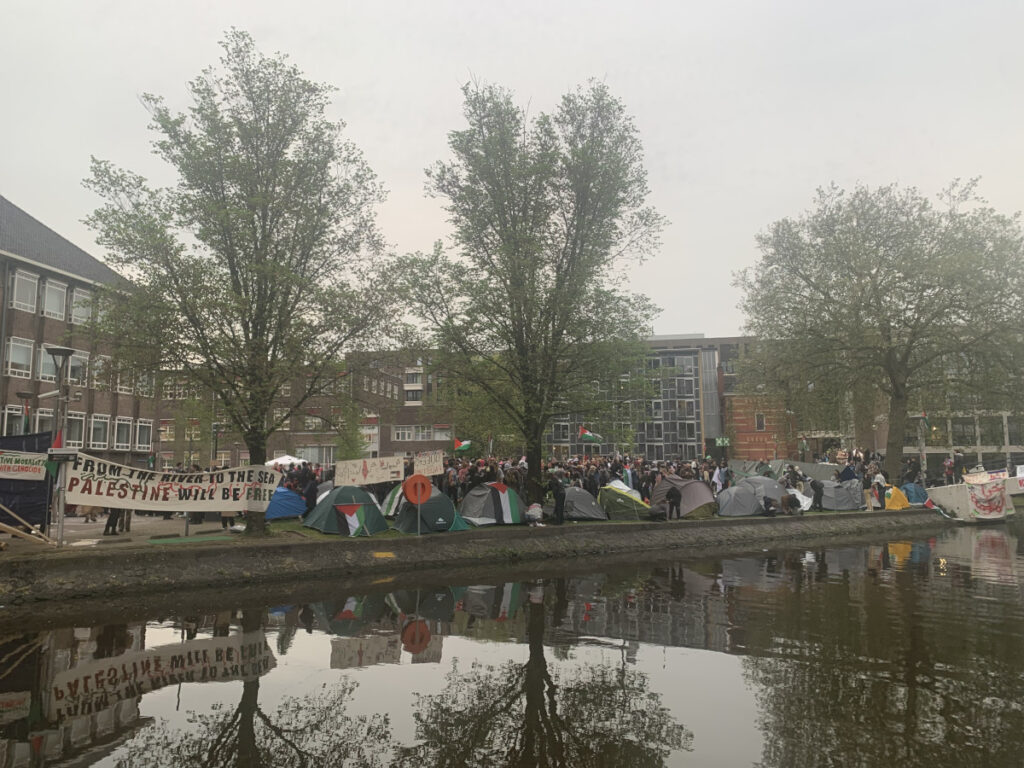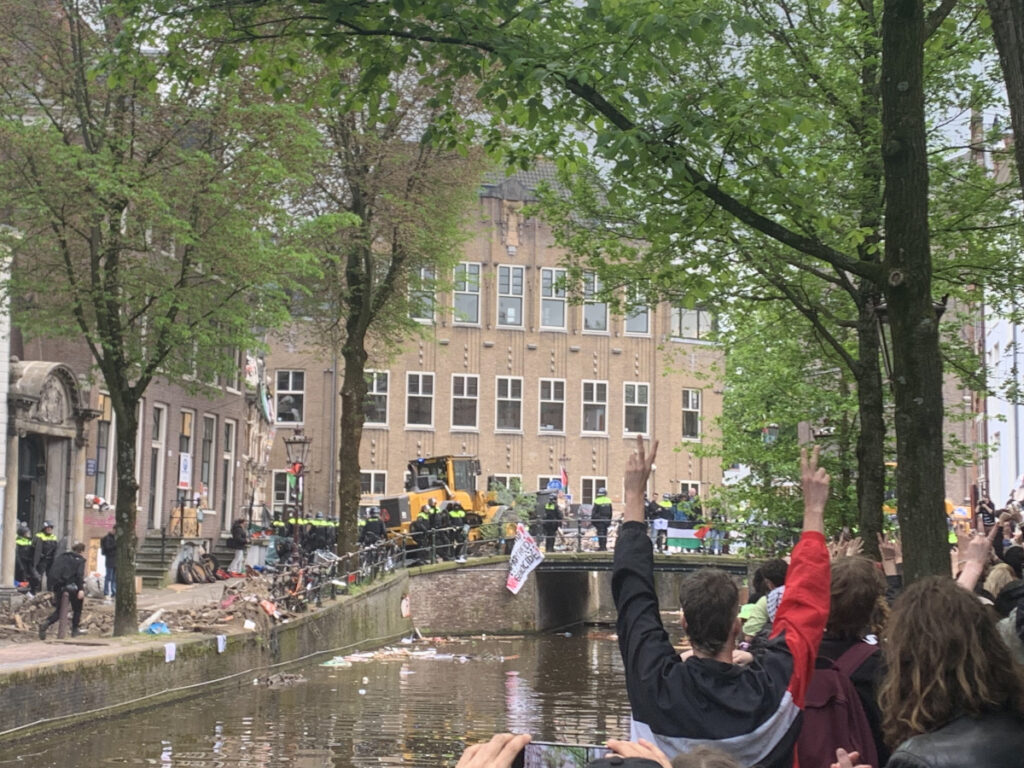
In the morning of the 6th of May, inspired by the swelling global wave of student solidarity encampments for Palestine, a group of students set up tents on a field of the University of Amsterdam Faculty of Social and Behavioral Sciences. The aim was to push university management to meet the students’ long-standing demands to disclose, divest and cut ties to Israeli institutions and thereby end the university’s complicity in genocide. At 6 pm that evening, staff was called upon to stand in solidarity and I went together with many colleagues. The atmosphere was euphoric as we had eagerly awaited a moment of collective political action to confront the ongoing bombing and starving of Gaza. Together, university management, police and the mayor of Amsterdam however decided to set the inglorious global record of being the quickest to shut down the encampment: at 3 am that night a bulldozer cleared the barricades and police violently evicted the camp.
Shocked at the police violence, a gathering was called the next day at 4 pm, in which many more students and staff showed up, in solidarity with Palestine and with our students who had suffered police violence. The gathering was full of energy and at the end of the planned speeches it turned into a demonstration of thousands marching to the inner-city campus of the university where a group of students occupied its famous “Oudemanhuispoort”. This time, the university management decided to let the encampment be for the night and set up a series of negotiations on the students’ demands.

And yet, the next day, when these negotiations had only just started, a massive police force was again unleashed on the student protestors, this time with two bulldozers clearing the occupation. From a short distance, behind the police cordon, students and staff who had rushed to the spot chanted “you are not alone” to show their solidarity and others tried to block the police vans carrying off student activists. That Saturday, the demonstration to commemorate the 76th anniversary of the Nakba in Amsterdam attracted as many as 10.000 protestors from all walks of life.
The Monday after – the 13th of May – a walk-out was called at the campus where it all started, and many students and staff again showed up. Standing on the bridge in front of the main entrance and surrounded by students holding up poster-size images of the covers of academic books on Palestine, an impressive line-up of speakers addressed the crowd. But none received as much applause – and elicited so many tears – as Jacob Engelberg. We are honored to reproduce his speech, as he gave it, here on Focaalblog:
Toespraak van dr. Jacob Engelberg bij de walkout van het UvA-medewerkers from Jacob on Vimeo.
“Hello friends. I join you today as a Jewish anti-Zionist member of staff here at the UvA [University of Amsterdam]; I name myself as both Jewish and anti-Zionist, as dominant discourses circulating—from the Israeli state to the Dutch media to our own CvB [Executive Board]—tend to imply that we do not exist. I assure you, we are many.
I have been working with colleagues in negotiations with our CvB to demand moral action from our university in the face of Israel’s genocide of the Palestinian people in Gaza. I have been deeply inspired by the passion and the moral clarity shown by our students in their call for the university to disclose, boycott, and divest. These urgent calls have been met, however, with repression, intimidation, defamation, and violence, as the CvB refuses to negotiate in good faith, spreads lies about its own students, and then recruits the police to violently repress dissent. We will not stand for the erosion of democratic freedoms at the institution in which we teach and learn. Indeed, teaching and learning cannot take place without the democratic freedoms we hold dear.
I stand here today not only as an academic, but as a Jewish member of our university community. Much has been said about how Jewish people are feeling on campus, but always in a way that erases the presence of Jewish students and staff, including Israeli students and staff, within our Palestine solidarity work. Instead, our community is presented as monolithically Zionist, and critique of the state of Israel is rewritten as antisemitism. In Dutch media and politics, we have heard the lie that the student movement at the UvA is antisemitic. This is a characterisation unrecognisable to those, like myself, who visited the encampment and joined students in their various forms of protest. These lies efface the Jewish students and staff whose efforts in these actions have been steadfast, and who were among those brutalised by the police. The notion that these forms of violence are necessary to secure our safety is a risible distortion of the notion of safety.
I am, of course, well aware that there are many within my community aligned with Zionism, who consider it intrinsic to their Jewish identities, and who see denouncements of Israel’s actions as a threat to their very being. To the Jewish students and staff who feel afraid at the sight of Palestine solidarity protest: I believe your fear. I implore you, however, to reflect on the roots of that fear. My wager is that, like me, you were taught by figures in our communal institutions to equate anti-Zionism with antisemitism. I expect you might have a visceral response to seeing the Palestinian flag, to hearing the phrase “From the River to the Sea,” or even at the very mention of the word Palestine. I want you to know that these responses are the cumulative effects of years of distorted narratives about Palestine solidarity, the history of the Zionist project, and the meaning of a free Palestine. I call on you to think critically about the presuppositions we have been taught to make, to listen to the voices we have been told to ignore. The university, at its best, should be a place where you can do this work of critical reflection.
The state of Israel’s impunity depends upon the support of a terrified diaspora, whose approval is garnered through distortions of real fears of Jewish unsafety, against which Israel then positions itself as the antidote. It uses the trauma of intergenerational experiences of antisemitism, and particularly the trauma of the Shoah, to justify its actions. Let us be clear that a Jewish ethnostate that subjugates, displaces, and murders Palestinians in our name does not make anyone safe. Crucially, Israel’s cynical deployment of Jewish fear turns our attention away from where antisemitism is burgeoning in our societies: in the far-right nationalist parties gaining momentum globally; in the transnational conspiracy theories circulating centuries-old lies about our people; in the rise of neofascism that has already taken the lives of our community members as they pray in shul. Zionism turns our eyes away from where antisemitism needs to be most forcefully resisted, encouraging us, instead, to turn on our Palestinian, Arab, or Muslim siblings. We must refuse this cynical ploy.
It was in my years as an undergraduate that I first began to question the Zionist doctrines with which I had been raised. I felt many fears, among them the fear that were I to critique Zionism, I would find myself bereft of community, bereft of ethnicity, bereft of identity, bereft of culture. What I discovered, however, was a rich tradition of Jewish anti-Zionism with a legacy that stretches from the Bundist movement in Imperial Russia to the very student protests we see globally today. Jewish anti-Zionists have built and will continue to nourish Jewish communities that stand, without reservation, in solidarity with the Palestinian struggle.
I am grateful for the invitation to speak today and I stand beside you in the struggle for a liberated Palestine in which all can live freely under conditions of radical equality from the river to the sea. Thank you.”
Jacob Engelberg is Assistant Professor of Film, Media, and Culture at the University of Amsterdam Department of Media Studies and the Amsterdam School for Cultural Analysis. His research considers the relations between sexuality and the cinema. He has completed research into pornographic film, articulations of Jewishness in transnational cinemas, and the cinema of Ingmar Bergman.
Luisa Steur is Assistant Professor at the Department of Anthropology, Universty of Amsterdam, and Managing and Lead Editor of Focaal—Journal of Global and Historical Anthropology. Her research interests lie in the field of political anthropology and the anthropology of labor with a regional focus on Kerala (India) and Cuba.
Cite as: Engelberg, Jacob 2024. “The Palestine solidarity encampments in Amsterdam: “We must refuse this cynical ploy”” Focaalblog 17 May. https://www.focaalblog.com/2024/05/17/jacob-engelberg-the-palestine-solidarity-encampments-in-amsterdam-we-must-refuse-this-cynical-ploy-introduced-by-luisa-steur/
Discover more from FocaalBlog
Subscribe to get the latest posts sent to your email.